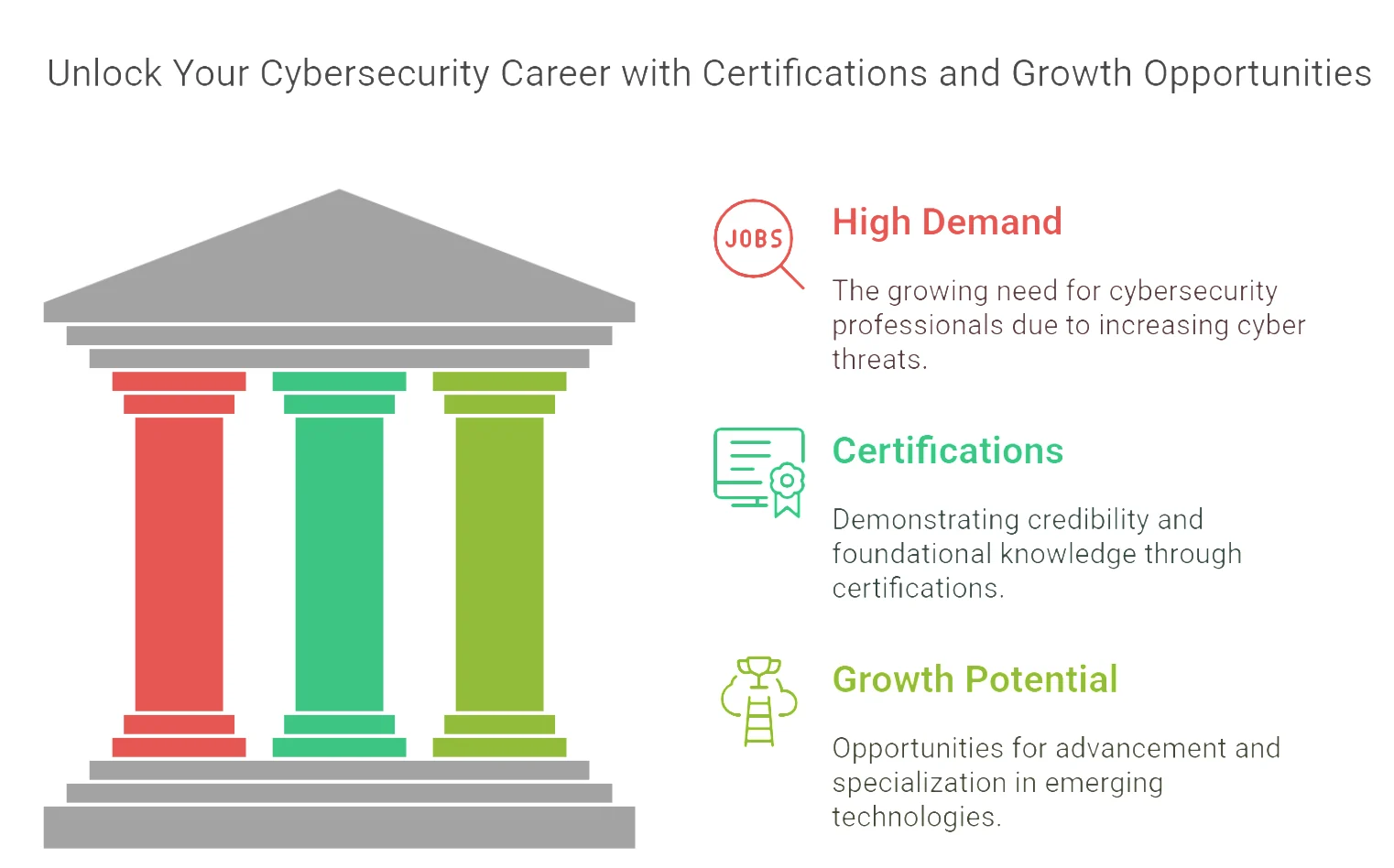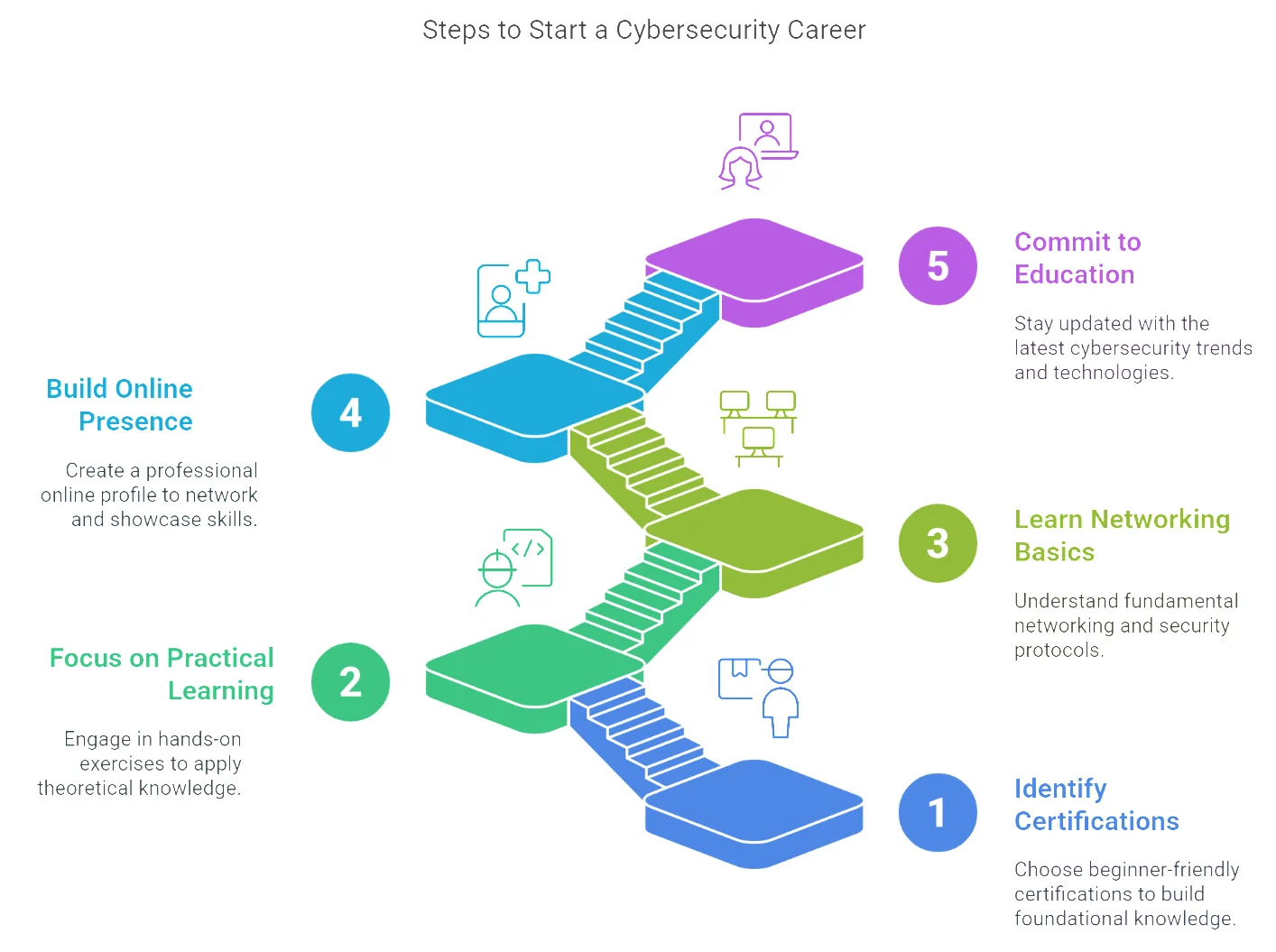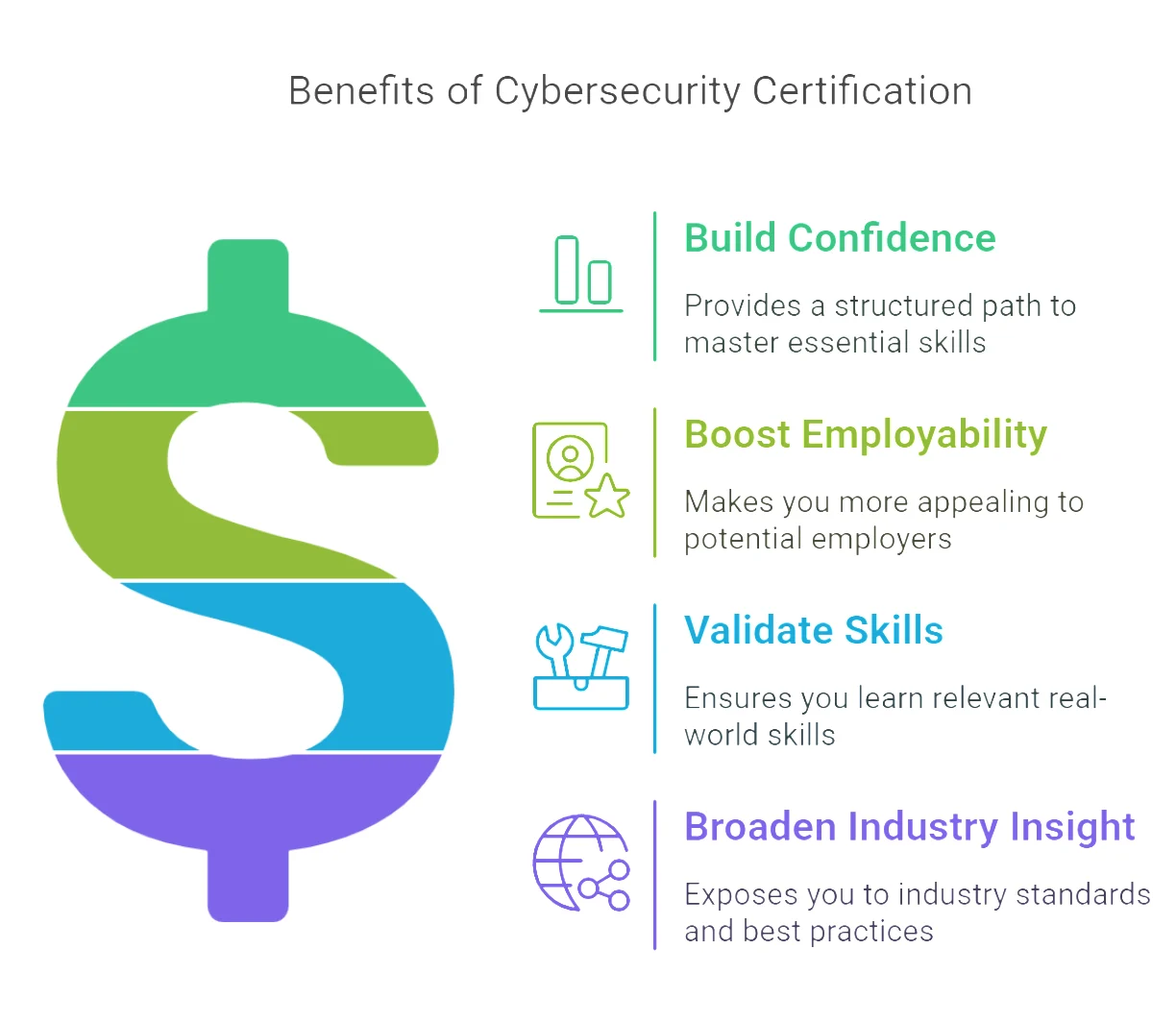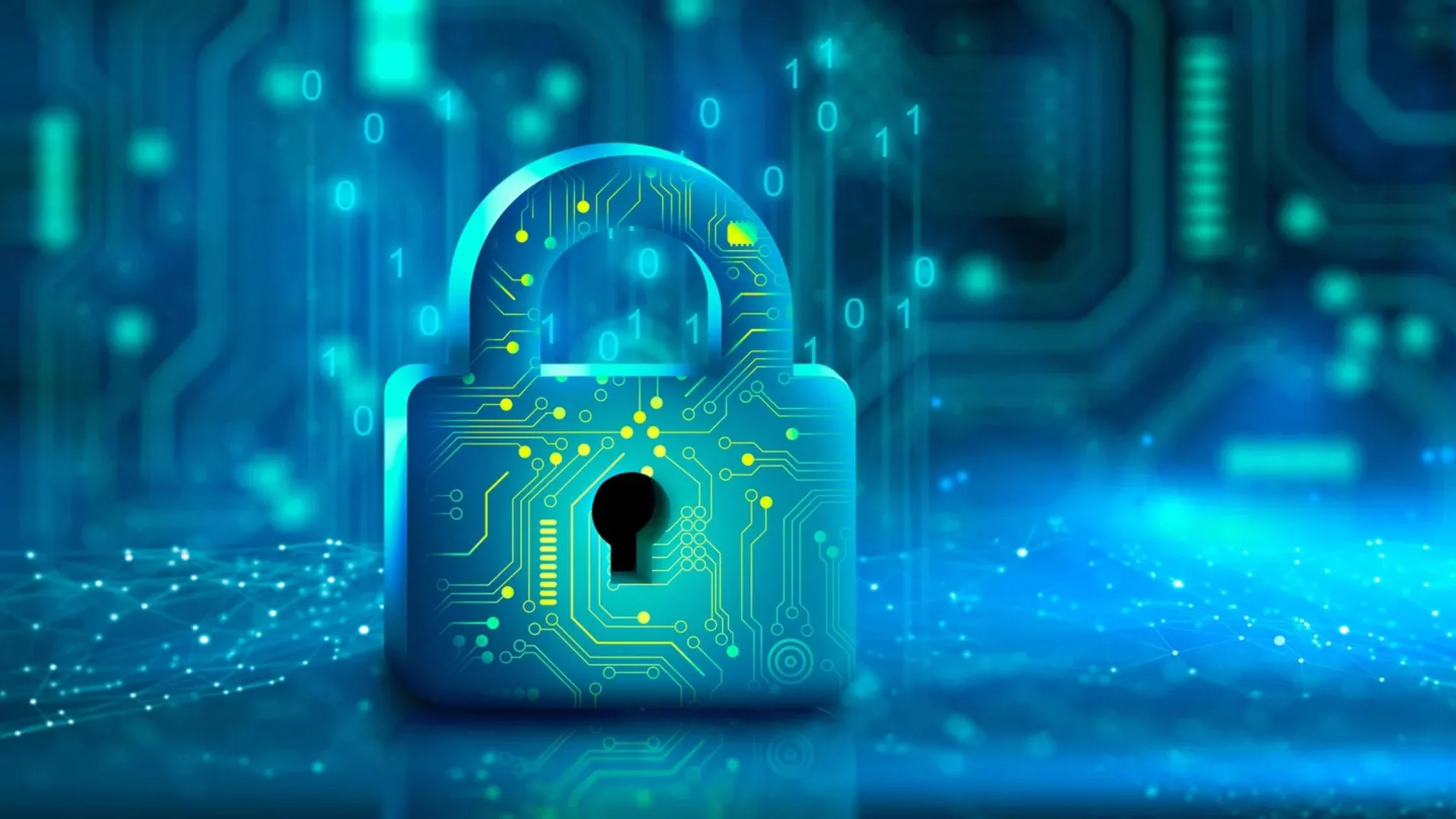Table of Contents
- Why Start a Cybersecurity Career with No Experience?
- How to Start Your Cybersecurity Journey with No Experience
- Why Choose a Cybersecurity Certification with No Experience from ACSMI?
- Key Benefits of a Cybersecurity Certification Program
- ACSMI’s Cybersecurity Program
- FAQ About Cybersecurity Certification No Experience
- Final Thoughts
The digital era has brought about tremendous growth in technology, but it has also introduced serious risks to individuals, businesses, and governments alike. Cyber threats are increasingly sophisticated, and the need for professionals skilled in cybersecurity has skyrocketed. Whether it’s protecting sensitive data or defending against ransomware, cybersecurity is vital to maintaining the integrity of modern technology infrastructures.
For many people, the thought of entering this field might seem daunting, especially for those with little or no experience. But the good news is, it is possible to break into cybersecurity even without prior experience, thanks to the increasing availability of cybersecurity certification no experience programs. These certifications provide an accessible and structured pathway to build the necessary skills and knowledge to pursue a successful career in cybersecurity. It’s also important to consider the Cybersecurity Certification Exam Fee, as understanding the cost can help you plan and choose the right certification that fits your budget and goals.
In this blog, we’ll explore how you can start your cybersecurity career with no prior experience, the types of certifications you should pursue, the benefits of certifications, and how you can build your skillset for long-term success in the field.
Why Start a Cybersecurity Career with No Experience?
Many aspiring professionals often feel that they need years of technical experience to break into the cybersecurity industry, but that’s not the case. Cybersecurity, like many other fields, values certifications as much as experience, especially for those just entering the workforce. If you’re new to the field, cybersecurity certifications no experience offer a structured approach to learning, allowing you to develop essential skills step-by-step.

1. High Demand for Cybersecurity Professionals
The demand for cybersecurity professionals is growing exponentially. As businesses, governments, and organizations increasingly rely on technology, the risk of cyberattacks has risen in parallel. These attacks can cause financial and reputational damage, making organizations more reliant than ever on cybersecurity to protect their networks and data.
In Australia, as well as many other countries, there is a severe shortage of skilled cybersecurity experts. According to estimates from AustCyber, there are thousands of unfilled roles within the industry, which has created significant opportunities for individuals pursuing cybersecurity careers.
2. Certifications Showcase Credibility
As a beginner, cybersecurity certifications are one of the best ways to demonstrate credibility to potential employers. These certifications validate your knowledge, skills, and commitment to the field, making it easier for hiring managers to assess your qualifications. Even without direct work experience, certifications provide you with a way to showcase that you have the foundational knowledge to be effective in the role.
3. Grow Without Limits
Cybersecurity is a dynamic field, with new threats and challenges emerging daily. Even entry-level positions can lead to advanced roles as you gain more experience and knowledge. Getting certified early on ensures that you have room for growth as you move through the ranks. As technology advances, there will always be new areas to explore, such as AI-driven security, cloud security, and blockchain technology, all of which require continued education and specialization.
How to Start Your Cybersecurity Journey with No Experience
Starting a cybersecurity career without prior experience may seem challenging, but a step-by-step approach can make it a manageable process. Here’s how to break into the cybersecurity field and get started on the right track.

1. Identify Beginner-Friendly Certifications
When starting out in cybersecurity, it’s important to select beginner-friendly certifications. These certifications offer an introduction to core concepts, without overwhelming you with complex, advanced topics. Some of the most recommended certifications for beginners include:
- CompTIA Security+: A great starting point, this certification covers foundational concepts such as network security, risk management, and cryptography.
- Certified Ethical Hacker (CEH): This certification focuses on penetration testing, hacking methodologies, and how to defend against cyber threats.
- Certified Information Systems Security Professional (Associate of CISSP): This certification is an entry-level version of the highly regarded CISSP and is ideal for those seeking a strong introduction to information security.
- ACSMI’s 400+ Module Program: This certification is a holistic option, offering a structured learning path from foundational concepts to advanced cybersecurity skills.
These certifications will give you the knowledge and confidence to begin your journey in the cybersecurity field.
2. Focus on Practical Learning
One of the biggest challenges for beginners is applying theoretical knowledge in real-world scenarios. Many cybersecurity certifications today emphasize hands-on learning through labs, case studies, and simulations.
For instance, the ACSMI Certification offers over 400 modules that provide real-world challenges and practical exercises to hone your skills. Look for programs that emphasize hands-on training, as this will better prepare you for actual job requirements, where you’ll need to identify vulnerabilities, mitigate risks, and respond to security incidents.
3. Learn the Basics of Networking and Security
To start a career in cybersecurity, you’ll need to familiarize yourself with fundamental technologies. Networking basics (e.g., firewalls, intrusion detection systems) and security protocols (e.g., encryption, multi-factor authentication) are vital for protecting IT systems. Many online courses and starter guides complement certification programs, helping you get a grasp on these foundational topics.
4. Build an Online Presence
In today’s world, having an online presence is crucial for professional networking and building your personal brand. Platforms like LinkedIn allow you to showcase your projects, certifications, and skills, and connect with industry professionals. GitHub is another great platform where you can share your cybersecurity projects and demonstrate your hands-on skills.
5. Commit to Continuous Education
Cybersecurity is a constantly evolving field. New technologies and emerging threats are always on the horizon. Once you’ve completed your certification, it’s essential to stay updated by pursuing continuous education. This can include attending webinars, enrolling in advanced courses, or staying updated on industry news and trends.
Why Choose a Cybersecurity Certification with No Experience from ACSMI?
If you’re looking for a comprehensive, beginner-friendly cybersecurity certification program, the ACSMI certification is one of the best options available. Whether you’re exploring Cybersecurity Certification on Coursera or comparing other programs, ACSMI’s program is designed to take you from beginner to expert with its structured, hands-on approach to learning. Here’s why ACSMI stands out:
Structured Learning
ACSMI offers over 400 modules, covering everything from basic network defense to advanced penetration testing. This modular structure allows you to progress at your own pace, ensuring you master each topic before moving to the next level.
Hands-On Training
The ACSMI program includes interactive labs and real-world scenarios, ensuring you can apply your knowledge to practical challenges. This hands-on experience is crucial for building confidence and preparing you for the real-world tasks you’ll face as a cybersecurity professional.
Global Recognition
ACSMI certifications are recognized globally, making them a valuable asset whether you plan to work in Australia, the United States, or anywhere else in the world. The certification is highly regarded by top employers, who recognize the depth of training and practical skills gained through ACSMI’s program.
Emerging Tech Focus
ACSMI’s certifications stay ahead of the curve by covering emerging technologies like blockchain security, cloud security, and artificial intelligence. This forward-thinking approach ensures that you’re prepared to meet the cybersecurity challenges of tomorrow.
Key Benefits of a Cybersecurity Certification Program
Opting for a cybersecurity certification no experience program offers several benefits that will significantly impact your career. Here’s how getting certified can help:

1. Build Confidence in a New Field
Entering a new field without prior experience can be intimidating. Cybersecurity certifications provide a clear, structured path to mastering essential skills. By following the program’s roadmap, you’ll feel more confident and capable of tackling cybersecurity challenges.
2. Boost Your Employability
With employers increasingly prioritizing certifications in the hiring process, having a recognized credential makes you more appealing to potential employers. A cybersecurity certification demonstrates that you have the skills and knowledge needed to protect their systems, even without prior work experience.
3. Validate Skills with Real-World Relevance
Many certifications focus on real-world skills, ensuring that you’re learning what’s most relevant to today’s cybersecurity challenges. Whether it’s identifying vulnerabilities or implementing security measures, these skills directly translate to job responsibilities and will be highly valued by employers.
4. Broaden Your Industry Insight
In addition to technical knowledge, cybersecurity certifications provide exposure to industry standards and global best practices. As a beginner, this exposure is invaluable as it helps you understand the broader context of cybersecurity and its evolving role across industries.
Final Thoughts
Starting a cybersecurity career with no experience might seem daunting, but it’s not only possible—it’s also a great way to tap into one of the most in-demand fields today. By choosing the right cybersecurity certification program, such as CompTIA Security+ or ACSMI, you’ll be equipped with the foundational knowledge and hands-on skills you need to start your career on the right foot.
The cybersecurity industry is vast, dynamic, and constantly evolving, making it an exciting career path with room for continuous growth. Certifications like these give you the confidence and credentials to pursue your career goals.
Don’t wait—start your cybersecurity journey today!
FAQ About Cybersecurity Certification No Experience
1. Can I start a cybersecurity career without any tech background?
Yes, absolutely! Beginner-friendly certifications like CompTIA Security+ and ACSMI’s program are designed with newcomers in mind. They start with the basics and gradually build up your knowledge.
2. How long does it take to earn a cybersecurity certification?
The time required to complete a certification varies. Entry-level certifications typically take 2–3 months, while more advanced programs like ACSMI’s 400+ module program could take longer.
3. Are certifications enough to get a job in cybersecurity?
Certifications are an essential part of your career entry but are best paired with hands-on projects and experience. This combination increases your chances of landing your first cybersecurity job.
4. What is an entry-level cybersecurity role?
Roles like Security Analyst, SOC Analyst, and Junior Penetration Tester are excellent entry-level positions that don’t require significant experience.
5. Why should I choose ACSMI over other programs?
ACSMI provides comprehensive training with over 400 modules that cover everything from network security to advanced penetration testing, making it an ideal choice for those serious about cybersecurity.

Leave a Reply